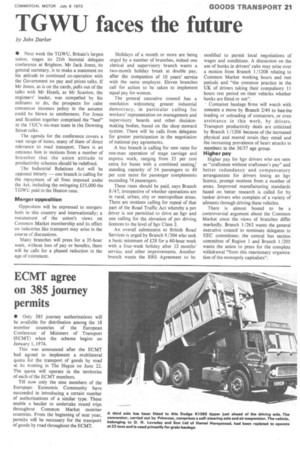TGWU faces the future
Page 23

If you've noticed an error in this article please click here to report it so we can fix it.
by John Darker • Next week the TGWU, Britain's largest union, stages its 25th biennial delegate conference at Brighton. Mr Jack Jones, its general secretary, is to make a statement on his attitude to continued co-operation with the Government on pay and prices talks. If Mr Jones, as is on the cards, pulls out of the talks with Mr Heath, as Mr Scanlon, the engineers' leader, was compelled by his militants to do, the prospects for calm consensus incomes policy in the autumn could be blown to smithereens. For Jones and Scanlon together comprised the "beer' in the TUC's six-man team in the Downing Street talks.
The agenda for the conference covers a vast range of items, many of them of direct relevance to road transport. There is an ominous hint in motions from a number of branches that the union attitude to productivity schemes should be redefined.
The Industrial Relations Act will be opposed bitterly — one branch is calling for the repayment of all fines imposed under the Act, including the swingeing £55,000 the TGWU paid in the Heaton case.
Merger opposition Opposition will be expressed to mergers both in this country and internationally; a restatement of the union's views on Common Market membership and its effect on industries like transport may arise in the course of discussions.
Many branches will press for a 35-hour week, without loss of pay or benefits, there will be calls for a phased reduction in the age of retirement. Holidays of a month or more are being urged by a number of branches, indeed one clerical and supervisory branch wants a two-month holiday break at double pay, after the completion of 10 years' service with the same employer. Eleven branches call for action to be taken to implement equal pay for women.
The general executive council has a resolution welcoming greater industrial democracy, in particular calling for workers' representation on management and supervisory boards and other decisionmaking bodies, based on the shop steward system. There will be calls from delegates for greater participation in the negotiation of national pay agreements.
A bus branch is calling for new rates for one-man operation of stage carriage and express work, ranging from 25 per cent extra for buses with a combined seating/ standing capacity of 54 passengers to 40 per cent more for passenger complements exceeding 74 passengers.
These rates should be paid, says Branch 8/47, irrespective of whether operations are in rural, urban, city or metropolitan areas. There are motions calling for repeal of that part of the Road Traffic Act whereby a psv driver is not permitted to drive an hgv and one calling for the elevation of psv driving licences to the level of hgv Class 2.
An overall submission to British Road Services is urged by Branch 9/304 who seek a basic minimum of £28 for a 40-hour week with a four-week holiday after 12 months' service, and other improvements. Another branch wants the BRS Agreement to be modified to permit local negotiations of wages and conditions. A discussion on the use of bunks in drivers' cabs may arise over a motion from Branch 1/1208 relating to Common Market working hours and rest periods and "the common practice in the UK of drivers taking their compulsory 11 hours rest period on their vehicles whether bunks are fitted or not".
Container haulage firms will watch with concern a move by Branch 2/49 to ban the loading or unloading of containers, or even assistance in this work, by drivers. Transport productivity deals are criticized by Branch 1/1206 because of the increased physical and mental strain they entail and the increasing prevalence of heart attacks in members in the 36/37 age group.
Higher pay Higher pay for hgv drivers who are seen as "craftsmen without craftsmen's pay" and better redundancy and compensatory arrangements for drivers losing an hgv licence, prompt motions from a number of areas. Improved manufacturing standards based on better research is called for by tanker drivers who complain of a variety of ailments through driving these vehicles.
There is almost bound to be a controversial argument about the Common Market since the views of branches differ markedly. Branch 1/262 wants the general executive council to nominate delegates to EEC committees; the central bus section committee of Region 1 and Branch 1/295 wants the union to press for the complete withdrawal "from this reactionary organization of the monopoly capitalists":




























































































































































